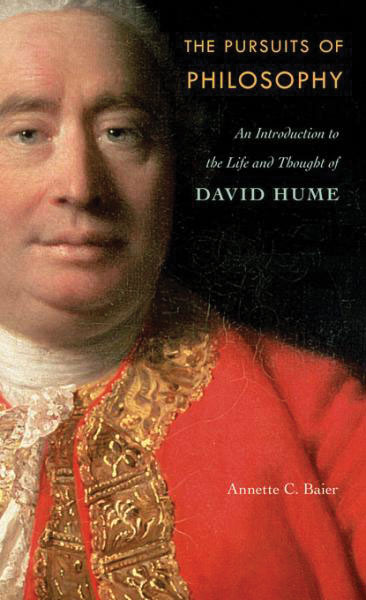 The Pursuits of Philosophy: An Introduction to the Life and Thought of David Hume
The Pursuits of Philosophy: An Introduction to the Life and Thought of David Hume
2011 is the tricentenary of David Hume’s birth, an occasion marked by Annette Baier with this odd but engaging little book. Having retired from the University of Pittsburgh in 1997, Baier remains their “Distinguished Service Professor of Philosophy Emerita” and is indeed distinguished as a Hume scholar. Perhaps because of this rather than despite it, her philosophical interpretation of Hume is distinctive – even quirky – so that those looking for the standard line on his thought might approach with some caution. Nor is there space in this slight work for arguments explaining and defending her heterodoxy – these can be found elsewhere in Baier’s oeuvre.
What we do get here is a blend of biography and philosophical overview organised around Hume’s own brief account of his life, which is reproduced in full with a section at the start of each chapter. This makes for a curious structure: the intellectual meat is front-loaded in a comparatively long chapter on Hume’s Treatise followed by several short ones detailing his various stints among English generals and French courtiers. As a result, however, The Pursuits of Philosophy is a much more readable introduction than many of its fellows and it gives a far clearer sense of the harmony underlying Hume’s patchy output than students or lay readers can usually glean.
Baier’s main interest is in the religious and social aspects of Hume’s thought. An unbeliever and critic of established religions, he was nonetheless no rabid atheist and maintained close friendships with prominent Christian contemporaries. Thus Baier stresses that Hume’s famed scepticism was of a strictly anti-dogmatic variety, here as elsewhere construing the character of his philosophy through his biography. In fact, Baier draws no sharp distinction between moral and philosophical character and is keen to distil wisdom from both life and works. Using his own self-assessment as a useful (if not unimpeachably candid) starting-point, she sketches Hume’s virtues as a philosopher and a man. Foremost among these is this very scepticism, which she glosses as a kind of calm detachment or disinterest.
It is through interweaving biography with philosophical interpretation that Baier is able to make such judgements, but the shortcomings of this format obtrude at the same time. A more sustained analysis of Hume’s thought might have problematised some of Baier’s conclusions. In particular, Hume’s epistemology does not receive the attention it merits: readers familiar with his theory of knowledge may well feel that it expresses a more radical and troubling brand of scepticism than Baier allows. If so, it might also seem that Hume’s genial and dispassionate persona rather belied than instantiated the real import of his philosophy. Enjoy the fruits of Baier’s many years of scholarship, then, but if you really want to wish a bonne anniversaire to “Le Bon David”, do be sure to approach this book with just a soupçon of his own scepticism.

